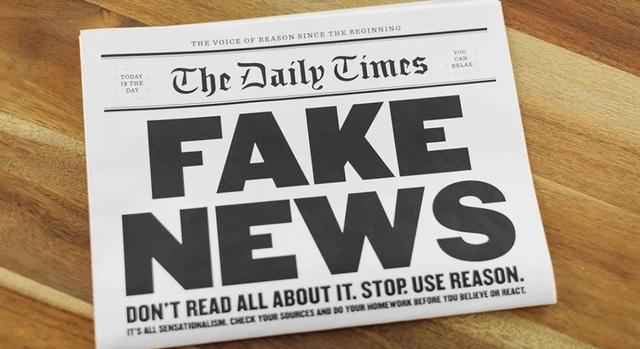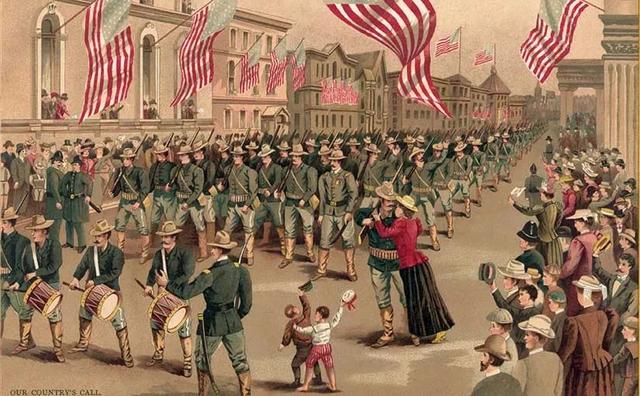
【往期回顾】
【本期内容】
A brief history of fake news
假新闻的发展简史

In 2017, ‘fake news’ became Collins Dictionary’s word of the year and it’s remained in the headlines ever since. Although the phrase might appear to be a modern invention, examples of it can be found throughout history.
2017年,“fake news(假新闻)”成为《柯林斯词典》的年度词汇,此后一直是头条新闻。尽管这个短语可能看起来是现代发明,但在整个历史上都可以找到它的例子。
From ancient Rome up to the present day, stories that are not true or are meant to be misleading have been used to make money, change people’s views and opinions and make us question who we can trust.
从古罗马到今天,不真实或具有误导性的故事一直被用来赚钱,改变人们的看法和观点,让我们质疑我们可以信任谁。
Now, with the explosion of the internet and social media, it seems to be everywhere and travels faster than at any other point in history.
现在,随着互联网和社交媒体的爆发,它似乎无处不在,传播速度比历史上任何时候都快。

Ancient history
古代时期
Around 2000 years ago, the Roman Republic was facing a civil war between Octavian, the adopted son of the great general Julius Caesar, and Mark Anthony, one of Caesar’s most trusted commanders.
大约2000年前,罗马共和国面临着伟大将军尤利乌斯·凯撒的养子屋大维和凯撒最信任的指挥官之一马克·安东尼之间的内战。
To win the war, Octavian knew he had to have the public on his side – winning important battles helped, but if the people didn’t like him, he would not be a successful ruler.
为了赢得这场战争,屋大维知道他必须让公众支持他——赢得重要的战斗会有所帮助,但如果人们不喜欢他,他就不会是一个成功的统治者。
To get public backing, Octavian launched a ‘fake news’ war against Mark Anthony.He claimed Anthony, who was having an affair with Cleopatra, the Egyptian Queen, didn’t respect traditional Roman values like faithfulness and respect. Octavian also said he was unfit to hold office because he was always drunk.
为了得到公众的支持,屋大维对马克·安东尼发动了一场“假新闻”战争。他声称安东尼与埃及女王克利奥帕特拉有染,他不尊重传统的罗马价值观,如忠诚和尊重。屋大维还说,他不适合担任公职,因为他总是醉醺醺的。
Octavian got his message to the public through poetry and short, snappy slogans printed on to coins. It was a bit like an ancient version of a politician today releasing a book or sending out a social media post. Octavian eventually won the war and became the first Emperor of Rome, ruling for over 40 years.
屋大维通过诗歌和印在硬币上的简短标语向公众传达了他的信息。这有点像古代版的政治家今天发布一本书或在社交媒体上发帖。屋大维最终赢得了这场战争,成为罗马的第一位皇帝,统治了40多年。

18th century
十八世纪
After the invention of the printing press in the 15th century, news (both real and fake) was able to spread faster than ever before. This technology meant books and other documents could be produced much quicker than any handwriting.
15世纪印刷机发明后,新闻(包括真新闻和假新闻)的传播速度比以往任何时候都快。这项技术意味着书籍和其他文件的制作速度比任何书写都快得多。
In the mid-1700s, the printing press helped to spread fake news about George II, who was the King of Great Britain and Ireland at the time. The King was facing a rebellion, and relied on being seen as a strong leader to make sure the rebellion didn’t succeed.
十八世纪中期,印刷机帮助传播了关于当时大不列颠及爱尔兰国王乔治二世的假新闻。国王正面临叛乱,他依靠被视为强有力的领导人来确保叛乱不会成功。
Fake news about the King being ill was printed from sources on the side of the rebels. It didn’t take long before these stories were seen by other printers who then republished them. This harmed the King’s public image, and although the rebellion wasn’t successful, showed how fake news can be used to try and change people’s opinions.
关于国王生病的假消息是从叛军方面传来的。没过多久,这些故事就被其他印刷商看到,然后重新出版。这损害了国王的公众形象,尽管叛乱没有成功,但也表明了假新闻是如何被用来试图改变人们的观点的。
The same thing happens today when a fake story is published on purpose to harm someone else. Unfortunately, if it isn’t fact-checked and gets shared by people or organisations thinking it is true, some of whom might have large followings, it starts to be taken seriously and the more it is shared the quicker it spreads… unchecked.
如今同样的事情也会发生,一个虚假的故事会被故意发布以伤害他人。不幸的是,如果它没有经过事实核查,并被相信它是真实的人或组织分享,其中一些人可能有大量追随者,它就会开始被当真了,进而分享得越多,传播得越快……最后不受控制。

Creatures on the Moon
月球上的生物
By the 19th century, newspapers were an easy and cheap way of getting news out to the public. In America, printing became so cheap that some papers could be bought for just a penny.
到十九世纪,报纸是向公众传播新闻的一种简单而廉价的方式。在美国,印刷变得如此便宜,以至于一些报纸只需一分钱就可以买到。
One of these papers, The New York Sun, published a series of articles in 1835 about life on the Moon. They described how there were fantastic animals such as unicorns, two-legged beavers and even flying bat-men!
其中一份报纸《纽约太阳报》,于1835年发表了一系列关于月球生命的文章。他们描述了那里有多么神奇的动物,比如独角兽、两足海狸,甚至还有会飞的蝙蝠人!
They wrongly claimed the discoveries were made by a well-known astronomer at the time, which helped people to believe the story was true.
他们错误地宣称这些发现是由当时一位著名的天文学家做出的,这有助于人们相信这个故事是真的。
These made-up stories were very popular, and sales of the paper shot up as readers all wanted to find out about this amazing ‘discovery’.
这些虚构的故事非常受欢迎,由于读者都想了解这一惊人的“发现”,报纸的销量激增。
The writer of the articles knew the story wasn’t true and had meant for this to be satire. This is when a writer uses humour and exaggeration to make fun of silly ideas, in this case that there were creatures living on the Moon.
这些文章的作者知道这个故事不是真的,原本仅是为了讽刺而已。为此,作家用幽默和夸张的手法来讽刺愚蠢的想法,于是他编造了月球上生活着动物的故事。
It still happens today a lot on social media. Sometimes comedy and satirical accounts will publish a made-up story supposed to make us laugh, and people share it thinking it’s true. This is another form of fake news.
今天,这种情况在社交媒体上仍然经常发生。有时,喜剧和讽刺文学会发布一个虚构的故事,让我们开怀大笑,人们会认为这是真的。这是另一种形式的假新闻。

Fake news and war
假新闻与战争
Propaganda has been used in wars throughout history to try and change people’s views. This is a type of fake news where false information is used for political gain. It can help change public opinion by persuading people that their country should go to war, or convince them the other side is their enemy.
历史上,宣传一直被用于战争,试图改变人们的观点。这是一种利用虚假信息获取政治利益的假新闻。它可以通过说服人们认为,他们的国家应该开战,或者说服他们,对方是他们的敌人,以此来帮助改变公众舆论。
In 1898, a United States Navy ship called USS Maine sank in Cuba. Some of the newspapers at the time blamed the Spanish for the sinking, and used artist’s illustrations of a dramatic explosion to convince readers that this was true. However, there was no real evidence of this being a fact.
1898年,一艘名为缅因号的美国海军舰艇在古巴沉没。当时的一些报纸将沉船事件归咎于西班牙人,并使用艺术家对强烈爆炸的插图来说服读者这是真的。然而,没有真正的证据表明这是事实。
Americans now saw the Spanish as the enemy. A few years later the Spanish-American war broke out. The false reports had worked.
美国人现在把西班牙人视为敌人。几年后,美西战争爆发。虚假报道起了作用。
Closer to home, in 1917 during the First World War, British newspapers such as the Times and the Daily Mail ran a gruesome story claiming that the Germans were extracting fat from the bodies of dead soldiers on both sides of the war to make soap and margarine.
在国内,1917年第一次世界大战期间,《泰晤士报》和《每日邮报》等英国报纸发表了一篇可怕的报道,声称德国人正在从战争双方死去士兵的尸体中提取脂肪来制造肥皂和人造黄油。
The story came from an official British government department and was spread to the press. The officials knew that this story wasn’t true, but it helped persuade readers that the Germans were a barbaric enemy and convinced many that they had to be defeated.
这个故事来自英国政府的一个官方部门,并被传播给了媒体。官员们知道这个故事不是真的,但它有助于说服读者相信,德国人是野蛮的敌人,并让许多人相信德国人必须被击败。

Fake news now
如今的假新闻
In recent years, there has been an explosion of fake news as false stories are shared widely on social media without being fact-checked. Cheap and portable access to the internet across the globe means stories can spread in a matter of seconds and minutes rather than days or weeks. Many of these stories are completely made up and can make money from advertising - the more clicks a website gets, the more money it makes.
近年来,假新闻激增,因为虚假故事在社交媒体上被广泛分享,而没有经过事实核查。在全球范围内,廉价且便携的互联网接入意味着故事可以在几秒钟和几分钟内传播,而不是几天或几周。这些故事中的许多内容都是完全虚构的,可以从广告中赚钱——网站的点击量越多,赚的钱就越多。
This often leads to clickbait, eye-catching but misleading headlines, designed to get people to click on links. Its purpose can be to generate clicks and advertisement money, but it can also be used to influence public opinion with headlines that appeal to our beliefs. This happened a lot during the 2016 US presidential election, where fake news about the candidates spread and could have influenced the public on how they voted.
这通常会导致标题党,即引人注目但具有误导性的标题,旨在让人们点击链接。它的目的可以是产生点击量和广告收入,但也可以用来通过吸引我们信仰的头条新闻来影响公众舆论。这种情况在2016年美国总统大选期间经常发生,关于候选人的假新闻在此期间传播,并可能影响公众的投票方式。
As fake news became more widespread, the term itself began to change. Politicians began to use the phrase to attack news organisations they disagreed with, accusing them of being the ones who spread fake news. By calling real news ‘fake news’, it allowed real ‘fake news’ to get more attention as people didn’t know who to trust – very confusing!
随着假新闻越来越普遍,这个词本身也开始发生变化。政客们开始用这个词来攻击他们不支持的新闻机构,指责他们是传播假新闻的人。通过将真实新闻称为“假新闻”,它让真实的“假消息”得到了更多的关注,因为人们不知道该信任谁——这非常令人困惑!

The future of fakes
假新闻的未来
Over the years, the development of technology has helped fake news spread through inventions like the printing press, photography and social media.
多年来,技术的发展帮助假新闻通过印刷机、摄影和社交媒体等发明得以传播。
Videos were usually a fairly reliable source of news, as they can’t be faked as easily as a photograph or headline. However, the reliability of video sources is now under threat from deepfakes. These are videos that use computer software and machine learning to create a digital version of someone. Normally it’s used to put the face of a celebrity or politician on to someone else’s body.
视频通常是相当可靠的新闻来源,因为它们不像照片或标题那样容易伪造。然而,视频来源的可靠性现在正受到深度造假的威胁。这些视频使用计算机软件和机器学习来创建某人的数字版本。通常,它被用来把名人或政治家的脸贴在别人的身上。
As the technology improves, deepfakes will become more realistic and harder to notice, but many amateur deepfakes can be spotted by unusual flickering or blurring around the face, so keep an eye out for that if you’re suspicious about a video you’ve seen.
随着技术的进步,深度造假将变得更加逼真,更难被注意到,但许多业余的深度造假可以通过脸周围不寻常的闪烁或糊线来发现,所以如果你对你看到的视频持怀疑态度,请注意这一点。

【Source】www.bbc.co.uk
【Translated by】Spark Liao (廖怀宝)
【Illustration】From Bing
